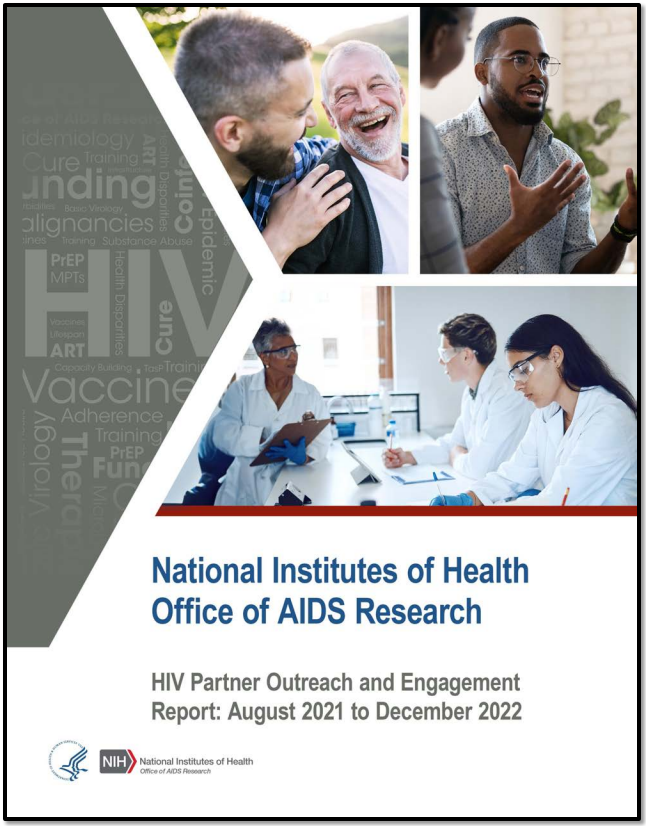NIH OAR HIV Partner Outreach and Engagement Report
OAR is proud to share the third serial report that summarizes input from the latest round of listening sessions hosted by the National Institutes of Health (NIH) Office of AIDS Research (OAR). These sessions serve as platforms to gather diversified input from partners including academia, public health agencies, community-based organizations, and advocacy groups, including people with lived experience.
The NIH OAR HIV Partner Outreach and Engagement Report: August 2021 to December 2022 summarizes findings from recent OAR-hosted listening sessions in Texas, Puerto Rico, the 2021 and 2022 US Conference on HIV/AIDS, and the 2022 National Council of Urban Indian Health Annual Conference and highlights some of the ways that input is informing the NIH HIV research program. Key topics include health and quality of life for women and people aging with HIV, HIV research workforce support, inclusion and cultural competence, social and structural factors, and information dissemination.
Report Overview

The NIH OAR coordinates the scientific, budgetary, legislative, and policy components of the NIH HIV research program. In support of its mission and to gather information to advance the NIH research agenda, OAR conducts outreach and engagement activities such as listening sessions; site visits; and meetings with academic institutions, community-based organizations, and other interested parties.
OAR expanded these efforts through a series of listening sessions initiated in 2018 that serve as platforms to gather diversified input. To date, OAR has conducted 52 listening sessions. Listening sessions were held in person until the beginning of the COVID-19 pandemic, when they shifted to a virtual format. Findings from the first of these events, summarized in reports covering the years 2018-2020 and 2020-2021 informed the development of the FY 2021–2025 NIH Strategic Plan for HIV and HIV-Related Research.
The NIH OAR HIV Partner Outreach and Engagement Report: August 2021 to December 2022 summarizes the findings of seven listening sessions held between August 2021 and December 2022 involving participants from academia, public health agencies, community-based organizations, and advocacy groups, including people with lived experience. The sessions were held in a variety of formats—in-person, virtual, and hybrid—and took place in Washington, D.C.; Houston, Texas; and San Juan, Puerto Rico.
Key Findings and Action Steps
Key findings and action steps from the seven sessions highlighted in this report are displayed below.
| Key Findings: Listening Session Topics | Priority NIH Action Steps |
|---|---|
|
|
|
|
|
|
|
|
|
|
|
|
There has been unprecedented progress in HIV research over the past 40 years that has propelled scientific discoveries and enabled rapid responses to emerging communicable diseases, such as COVID-19 and mpox. People engaged in the HIV response span all ages, genders, races, ethnicities, and geographies. Continuation and expansion of listening sessions and engagement activities across diverse partners, settings, and populations will ensure that groups and locations most affected by HIV are included and represented in the NIH HIV research agenda.
Additional Resources
Read the NIH OAR HIV Stakeholder Outreach and Engagement Report: June 2018 to February 2020
Read the NIH OAR Second HIV Stakeholder and Engagement Report: September 2020 to July 2021
This page last reviewed on August 7, 2024

